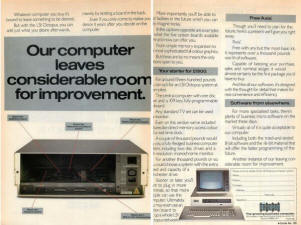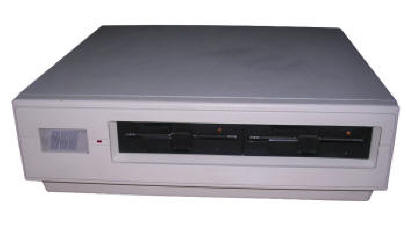Hilger Analytical AB6089 Mk. 1
(LSI Octopus)
I bought it with another computer for lower price, and
I expected it to be some kind of a normal CP/M machine. But well, it's
not. It has very futuristic design, even as for late 80s, but it's made
of the same plastic as these old machines in 1980s, only covered with
paint. The logo in the front sticker isn't a well-known comuter company,
it's a logo of measurement devices manufactuer, registered in 1984/85.
The computer has 2 CPUs: Z80 and 8088. Most circuits are dated
1985-1986, display circuitry is made by Signetics. Mainboard was
manufactured by LSI Computers Ltd. under part numbers: 15000SS100 and
15000P4100. All steel parts of casing are grounded by wires. It's graphics card works in pass-through mode: It takes picture from
mainboard's TTL output and adds image to it, then it puts it to
monitor. It's ROM is prepared for hard disk and some type of network,
yet no HDD controller nor network interfaces are present inside - it
seems that they were added as expansion cards.
| UPDATE: It's re-branded LSI Octopus computer, a
very well-expandable machine which was designed to "grow with a
company". First stage was a computer which could be used even with TV
set. As requirements increased, Octopus could be equipped with hard disk
controller, network adapter, multi-terminal serial port card to act as a
terminal server or even CPU cards to run concurrent systems. There were
even tape backup devices for it. Octopus could run CP/M, MP/M (concurrent
- multitasking-like OS, even with terminal stations), or even MS-DOS - CP/M or
MP/M could be used with Z80 or 8088. There was also LSI ELSIE system, a
concurrent DOS. Last British LSI machines were 386 computers which could be used as servers for Octopus computers. |
| Manufacturer | Hilger Analytical / LSI Computers Ltd. |
|
| Origin | UK | |
| Year of unit | 1986? | |
| Year of introduction | 1985 | |
| End of production | ? | |
| CPU | Z80, 8088 | |
| Speed | ?? | |
| RAM | 256kB | |
| ROM | 16kB (Basic) | |
| Colors: | ?? | |
| Sound: | Speaker. Beeps :) | |
| OS: | CP/M 80 or 86 MP/M 80 o 86 Concurrent CP/M LSI ELSIE MS-DOS |
|
| Display modes: | Text: ?? Graphics: ?? |
|
| Media: |
Two internal 5.25" floppy disk drives, DS DD, 96tpi. Probably hard disk |
Power supply: |
|
|
||
|
Built-in switching power supply. |
||
| I/O: | Serial port 2 parallel ports Video TTL Output Composite video output |
|
| Possible upgrades: | Many | |
| Software accessibility: | Dedicated:
Impossible. CP/M - Good DOS - Good. |
|
My unit has 213 serial number. I don't think I'll find a
keyboard for it. It won't take XT nor AT keyboard, but pinout is quite
similar.
UPDATE: I saw a few photos of keyboard. It's another Z80 computer
inside.
It has an EPROM, simple memory and CPU.
If the unit displays garbled image, like picture lines are out of
order (but see if all ~9 pieces of cursor blink), both in composite and DB9, it's in 99% cases NOT computer's fault.
Its video has strange timing by design, With DIP Switch SW1/8 (default
is OFF and this one works, mode with ON seems not to display any text but
only cursor) you can switch between one and another strange text modes,
both are incompatible with most displays.
Generally:
- Blank screen on DB9, garbled on Composite -> Wrong DB9 monitor.
- Garbled screen on DB9, grabled on Composite -> Wrong DB9 monitor.
- Good image on Composite -> Wonder :).
I tried it with many monitors. I can only say that:
- Commodore 1404, EMC EM-1404, EMC EM1412, -> blank screen.
- Hyundai CGA, ADI DM-14+, INTRA green monitor -> garbled text.
- Polkolor MM14SP -> Works. It's rare.
After powering on, it should perform POST writing:
TESTING...
Main Processor
PROM
DMA Controllers
RAM
Interrupts
Floppy Discs
Hard Disc Controller (optionally
- if installed)
Waiting for hard Disc... (Optionally - if installed)
Firmware versions:
SYSTEM
18B (or other)
GRAPHICS 4
(if graphic card installed)
And probably it should boot or display:
Insert System Disk.
Or maybe:
Nowhere to boot from.
Load options:
Floppy
Pro Network
Winchester
Enter selection:
This information was gained by studying boot ROM of the machine.
I wish I could write something more about this unit, but I don't know much. It's a very rare computer. It has 2 processors, Z80 and 8088, so it seems that it may run CP/M and DOS. It's BIOS performs POST and halts as there's no keyboard.






